Full Program
Times in the program are shown in BRT Time (UTC -3).
Tuesday, January 5
| BRT TIME | ACTIVITY (place) | |
|---|---|---|
| 9:00 AM | Getting to know Virtual Chair space | |
| 9:40 AM | Opening (auditorium) | |
| 10:00 AM | Technical session 1 (room B) Chair: Carla Negri Lintzmayer |
Technical session 2 (room A) Chair: Guilherme Oliveira Mota |
| 10:00 AM | J. R. S. Blair, P. Heggernes, Paloma T. Lima, and D. Lokshtanov On the maximum number of edges in chordal graphs of bounded degree and matching number |
Chen Avin, K. Mondal, and S. Schmid Dynamically Optimal Self-Adjusting Single-Source Tree Networks |
| 10:20 AM | H. Bodlaender, N. Brettell, M. Johnson, Giacomo Paesani, D. Paulusma, and E. Jan van Leeuwen Steiner Trees for Hereditary Graph Classes |
A. Bonato, Konstantinos Georgiou, C. MacRury, and P. Prałat Probabilistically Faulty Searching on a Half-Line |
| 10:40 AM | Z. Deniz, S. Nivelle, B. Ries, and David Schindl On some subclasses of split B1-EPG graphs |
S. Chaplick, M. M. Halldórsson, Murilo S. de Lima, and T. Tonoyan Query Minimization under Stochastic Uncertainty |
| 11:00 AM | Ny A. Andriambolamalala and V. Ravelomanana Transmitting Once to Elect a Leader on Wireless Networks |
|
| 11:20 AM | Extra Q&A for technical sessions (lobby) / Break | |
| 11:40 AM | Plenary lecture: Nikhil Bansal (auditorium) Chair: Kirk Pruhs |
|
| 12:40 PM | Poster session 1 (lobby) / Lunch break | |
| 13:40 PM | Plenary lecture: Maria-Florina Balcan (auditorium) Chair: Gonzalo Navarro |
|
| 14:40 PM | Break | |
| 15:00 PM | Technical session 3 (room B) Chair: Carla Negri Lintzmayer |
Technical session 4 (room A) Chair: Yoshiko Wakabayashi |
| 15:00 PM | G. Barequet and Gil Ben-Shachar On Minimal-Perimeter Lattice Animals |
Md Luftar Rahman and T. Watson Tractable Unordered 3-CNF Games |
| 15:20 PM | Due to technical difficulties, this talk was moved to Thursday, at 11h. | Bruno P. Cavalar, M. Kumar, and B. Rossman Monotone Circuit Lower Bounds from Robust Sunflowers |
| 15:40 PM | R. Daknama, K. Panagiotou, and Simon Reisser Asymptotics for Push on the Complete Graph |
T. Marcilon, N. Martins, and Rudini Sampaio Hardness of variants of the graph coloring game |
| 16:00 PM | Andrew Read-McFarland and D. Štefankovič The Hardness of Sampling Connected Subgraphs |
|
| 16:20 PM | H. Hàn, M. Kiwi, and Matías Pavez-Signé Quasi-random words and limits of word sequences |
|
| 16:40 PM | Extra Q&A for technical sessions (lobby) | |
Wednesday, January 6
| BRT TIME | ACTIVITY (place) | |
|---|---|---|
| 9:00 AM | Socialization | |
| 10:00 AM | Technical session 5 (room B) Chair: Rafael Oliveira |
Technical session 6 (room A) Chair: Sándor Fekete |
| 10:00 AM | Benjamin Rossman Thresholds in the Lattice of Subspaces of Fqn |
E. Arseneva, P. Bose, Pilar Cano, and R. I. Silveira Flips in higher order Delaunay triangulations |
| 10:20 AM | K. Shimizu and Ryuhei Mori Exponential-time Quantum Algorithms for Graph Coloring Problems |
Mincheol Kim, S. D. Yoon, and H.-K. Ahn Shortest Rectilinear Path Queries to Rectangles in a Rectangular Domain |
| 10:40 AM | S. Dantchev, Abdul Ghani, and B. Martin Sherali-Adams and the binary encoding of combinatorial principles |
Ioannis Mantas, E. Papadopoulou, V. Sacristán, and R. I. Silveira Farthest color Voronoi diagrams: complexity and algorithms |
| 11:00 AM | Siddhesh Chaubal and A. Gál Tight Bounds on Sensitivity and Block Sensitivity of Some Classes of Transitive Functions |
Daria Pchelina, N. Schabanel, S. Seki, and Y. Ubukata Simple Intrinsic Simulation of Cellular Automata in Oritatami Molecular Folding Model |
| 11:20 AM | Extra Q&A for technical sessions (lobby) / Break | |
| 11:40 AM | Plenary lecture: Maria Chudnovsky (auditorium) Chair: Celina M. H. de Figueiredo |
|
| 12:40 PM | Poster session 2 (lobby) / Lunch break | |
| 13:40 PM | Plenary lecture: Eduardo Sany Laber (auditorium) Chair: Ferdinando Cicalese |
|
| 14:40 PM | Break | |
| 15:00 PM | Technical session 7 (room B) Chair: Lehilton Pedrosa |
|
| 15:00 PM | Khaled Elbassioni Approximation Algorithms for Cost-robust Discrete Minimization Problems Based on their LP-Relaxations |
|
| 15:20 PM | V. Fagnon, I. Kacem, G. Lucarelli, and Bertand Simon Scheduling on Hybrid Platforms: Improved Approximability Window |
|
| 15:40 PM | L. L. C. Pedrosa and Hugo K. K. Rosado A 2-approximation for the k-prize-collecting Steiner tree problem |
|
| 16:00 PM | P. A. Golovach, Paloma T. Lima, and C. Papadopoulos Graph Square Roots of Small Distance from Degree One Graphs |
|
| 16:20 PM | J. Clément and Antoine Genitrini Binary Decision Diagrams: from Tree Compaction to Sampling |
|
| 16:40 PM | Extra Q&A for technical sessions (lobby) | |
Thursday, January 7
| BRT TIME | ACTIVITY (place) | |
|---|---|---|
| 9:00 AM | Socialization | |
| 10:00 AM | Technical session 8 (room B) Chair: Arnaldo Mandel |
Technical session 9 (room A) Chair: Cláudia Linhares Sales |
| 10:00 AM | Sergey Bereg Computing Balanced Convex Partitions of Lines |
J. Byrka, Mateusz Lewandowski, S. M. Meesum, J. Spoerhase, and S. Uniyal PTAS for Steiner Tree on Map Graphs |
| 10:20 AM | P. Pérez-Lantero, Carlos Seara, and J. Urrutia Rectilinear convex hull of points in 3D |
R. Duan, H. He, and Tianyi Zhang Near-linear Time Algorithm for Approximate Minimum Degree Spanning Trees |
| 10:40 AM | Frank Bauernöppel, A. Maheshwari, and J.-R. Sack An Ω(n3) Lower Bound on the Number of Cell Crossings for Weighted Shortest Paths in 3-dimensional Polyhedral Structures |
C. G. Fernandes and Carla N. Lintzmayer Leafy Spanning Arborescences in DAGs |
| 11:00 AM | G. Barequet and Mira Shalah Improved Upper Bounds on the Growth Constants of Polyominoes and Polycubes |
L. L. C. Pedrosa and Greis Y. O. Quesquén Approximating Routing and Connectivity Problems with Multiple Distances |
| 11:20 AM | Extra Q&A for technical sessions (lobby) / Break | |
| 11:40 AM | Plenary lecture: Bianca Zadrozny (auditorium) Chair: Roberto Imbuzeiro Oliveira |
|
| 12:40 PM | Poster session 1 (lobby) / Lunch break | |
| 13:40 PM | Plenary lecture: Alexander Razborov (auditorium) Chair: Marcos Kiwi |
|
| 14:40 PM | Break | |
| 15:00 PM | Awards session (auditorium) | |
| 15:30 PM | Business meeting (auditorium) | |
Friday, January 8
| BRT TIME | ACTIVITY (place) | |
|---|---|---|
| 9:00 AM | Socialization | |
| 10:00 AM | Technical session 10 (room B) Chair: Martin Dietzfelbinger |
Technical session 11 (room A) Chair: Jayme Luiz Szwarcfiter |
| 10:00 AM | Ido Nachum and A. Yehudayoff On Symmetry and Initialization for Neural Networks |
Guilherme C. M. Gomes, M. R. Guedes, and V. F. dos Santos Structural Parameterizations for Equitable Coloring |
| 10:20 AM | Bertie Ancona, A. Bajwa, N. Lynch, and F. Mallmann-Trenn How to Color a French Flag: Biologically Inspired Algorithms for Scale-Invariant Patterning |
P. A. Golovach, R. Krithika, Abhishek Sahu, S. Saurabh, and M. Zehavi Graph Hamiltonicity Parameterized by Proper Interval Deletion Set |
| 10:40 AM | Shunsuke Inenaga Suffix Trees, DAWGs and CDAWGs for Forward and Backward Tries |
Sancrey R. Alves, F. Couto, L. Faria, S. Gravier, S. Klein, and U. S. Souza Graph sandwich problem for the property of being well-covered and partitionable into k independent sets and ℓ cliques |
| 11:00 AM | T. Kociumaka, G. Navarro, and Nicola Prezza Towards a Definitive Measure of Repetitiveness |
M. Groshaus, A. L. P. Guedes, and Fabricio S. Kolberg On the Helly Subclasses of Interval Bigraphs and Circular Arc Bigraphs |
| 11:20 AM | Extra Q&A for technical sessions (lobby) / Break | |
| 11:40 AM | Plenary lecture: Luca Trevisan (auditorium) Chair: Marcel Kenji de Carli Silva |
|
| 12:40 PM | Poster session 2 (lobby) / Lunch break | |
| 13:40 PM | Plenary lecture: Nicole Immorlica (auditorium) Chair: Cristina G. Fernandes |
|
| 14:40 PM | Break | |
| 15:00 PM | Technical session 12 (room B) Chair: Conrado Martínez |
Technical session 13 (room A) Chair: Martin Fürer |
| 15:00 PM | Miklos Bóna A method to prove the nonrationality of some combinatorial generating functions |
Charles Carlson, A. Kolla, R. Li, N. Mani, B. Sudakov, and L. Trevisan Lower Bounds for Max-Cut via Semidefinite Programming |
| 15:20 PM | Louisa S. Benkner and S. Wagner On the Collection of Fringe Subtrees in Random Binary Trees |
Costin Bădescu and R. O'Donnell Lower Bounds for Testing Complete Positivity and Quantum Separability |
| 15:40 PM | M. A. Bender, Mayank Goswami, D. Medjedovic, P. Montes, and K. Tsichlas Batched Predecessor and Sorting with Size-Priced Information in External Memory |
K. Buchin, D. Kosolobov, Willem Sonke, B. Speckmann, and K. Verbeek Ordered Strip Packing |
| 16:00 PM | I. Bliznets and Danil Sagunov Maximizing Happiness in Graphs of Bounded Clique-Width |
Chen Avin, K. Mondal, and S. Schmid Dynamically Optimal Self-Adjusting Single-Source Tree Networks |
| 16:20 PM | Closing remarks (auditorium) | |
| 16:30 PM | Extra Q&A for technical sessions (lobby) | |
Plenaries
Speaker: Nikhil Bansal (CWI and Eindhoven University of Technology)
Title: Discrepancy, Rounding and Approximation
Abstract: Discrepancy theory deals with the following question: Given a set system on some universe of elements, color the elements red and blue so that each set in the system is colored as evenly as possible. I will give an overview of discrepancy and describe some of its applications. Then we focus on some results and techniques in discrepancy, and in particular show how they can be used to design new general rounding techniques leading to improved approximation guarantees for various algorithmic problems.
Speaker: Maria-Florina Balcan (Carnegie Mellon University)
Title: Data-driven algorithm design
Abstract: Data-driven algorithm design for combinatorial problems
is an important aspect of modern data science. Rather than using off
the shelf algorithms that only have worst case performance guarantees,
practitioners typically optimize over large families of parameterized
algorithms and tune the parameters of these algorithms using a training
set of problem instances from their domain to determine a configuration
with high expected performance over future instances. However, most of
this work comes with no performance guarantees. The challenge is that
for many combinatorial problems, including partitioning and subset
selection problems, a small tweak to the parameters can cause a cascade
of changes in the algorithm's behavior, so the algorithm's performance
is a discontinuous function of its parameters.
In this talk, I will present new work that helps put data-driven
combinatorial algorithm selection on firm foundations. This includes
strong computational and statistical performance guarantees, both for
the batch and online scenarios where a collection of typical problem
instances from the given application are presented either all at once
or in an online fashion, respectively. I will describe both specific
examples (for clustering, partitioning, and subset selection problems)
and general principles that emerge in this context (including general
techniques for sample complexity guarantees in the batch setting and
no-regret guarantees in the online settings).
Speaker: Maria Chudnovsky (Princeton University)
Title: Induced subgraphs and tree decompositions
Abstract: Tree decompositions are a powerful tool in structural graph theory, that is traditionally used in the context of forbidden graph minors. Connecting tree decompositions and forbidden induced subgraphs has so far remained out of reach. Recently we obtained several results in this direction; the talk will be a survey of these results.
Speaker: Eduardo Sany Laber (Pontifical Catholic University of Rio de Janeiro)
Title: On the Price of Explainability for some Clustering Problems
Abstract: Machine learning models and algorithms have been used in a number of systems that take decisions that affect our lives. Thus, explainable methods are desirable so that people are able to have a better understanding about their behaviour. However, we may be forced to lose quality and/or efficiency in order to achieve explainability. In this talk we investigate, from a theoretical perspective, the price of explainability for some clustering problems.
Speaker: Bianca Zadrozny (IBM Research Brazil)
Title: Evaluating classifier learning methods under covariate shift and spatial correlation
Abstract: Classifier learning methods commonly assume that the training data consist of randomly drawn examples from the same distribution as the test examples about which the learned model is expected to make predictions. In the real world, the joint distribution of inputs to the model and outputs of the model differs between training and test data, a problem known as sample selection bias or dataset shift. In this talk, I will review existing methods for dealing with this problem, in particular of the special case known as covariate shift where only the input distribution changes and the conditional distribution of the output for a given input is assumed to remain fixed. I will then introduce the problem of covariate shift in geospatial data and illustrate the challenges of learning from geospatial data by assessing existing methods for evaluating the accuracy of classifier learning methods under covariate shift and spatial correlation.
Speaker: Alexander Razborov (The University of Chicago)
Title: Theons and Quasi-Randomness
Abstract: There are two known approaches to the theory of limits of
discrete combinatorial objects: geometric (graph limits) and algebraic
(flag algebras). In the first part of the talk we present a general
framework intending to combine useful features of both theories and
compare it with previous attempts of this kind. Our main objects are
T-ons, for a universal relational first-order theory T; they generalize
all previously considered partial cases, some of them (like permutons)
in a rather non-trivial way.
In the second part we apply this framework to offer a new perspective
on quasi-randomness for combinatorial objects more complicated than
ordinary graphs. Our quasi-randomness properties are natural in the
sense that they do not use ad hoc densities and they are preserved
under the operation of defining combinatorial structures of one kind
from structures of a different kind. One key concept in this theory is
that of unique coupleability roughly meaning that any alignment of two
objects on the same ground set should "look like" random.
Based on two joint papers with Leonardo Coregliano: Russian
Mathematical Surveys (2020, 75(4)) and arXiv:2012.11773.
Speaker: Luca Trevisan (Bocconi University)
Title: Graph and Hypergraph Sparsification
Abstract: A weighted graph H is a sparsifier of a graph G if H has
much fewer edges than G and, in an appropriate technical sense, H
"approximates" G. Sparsifiers are useful as compressed representations
of graphs and to speed up certain graph algorithms. In a "cut
sparsifier", the notion of approximation is that every cut is crossed
by approximately the same number of edges in G as in H. In a "spectral
sparsifier" a stronger, linear-algebraic, notion of approximation
holds. Similar definitions can be given for hypergraph.
We discuss recent progress on constructions and lower bounds for graph
and hypergraph sparsification, and we point out some challenging open
problems.
Speaker: Nicole Immorlica (Microsoft Research)
Title: Incentivizing Exploration with Selective Data Disclosure
Abstract: We study the design of rating systems that incentivize
efficient social learning. Agents arrive sequentially and choose
actions, each of which yields a reward drawn from an unknown
distribution. A policy maps the rewards of previously-chosen actions to
messages for arriving agents. The regret of a policy is the difference,
over all rounds, between the expected reward of the best action and the
reward induced by the policy. Prior work proposes policies that
recommend a single action to each agent, obtaining optimal regret under
standard rationality assumptions. We instead assume a frequentist
behavioral model and, accordingly, restrict attention to disclosure
policies that use messages consisting of the actions and rewards from a
subsequence of past agents, chosen ex ante. We design a policy with
optimal regret in the worst case over reward distributions. Our
research suggests three components of effective policies: independent
focus groups, group aggregators, and interlaced information
structures.
Joint work with Jieming Mao, Alex Slivkins and Steven Wu.
Posters
We organized poster sessions to facilitate and promote attendance.
We especially encouraged students and young researchers to submit their preliminary findings and ongoing work covering all the subjects of LATIN 2020.
In all sessions, the presenters will be available from 9h30 to 10h (BRT time) in the Virtual Chair venue space.
Poster session 1 (Tuesday and Thursday)
| TITLE | AUTHORS | PRESENTER | DOWNLOAD |
|---|---|---|---|
| Coefficients of the solid angle and Ehrhart quasi-polynomials (abstract) | Fabrício C. Machado and Sinai Robins | Fabrício C. Machado | 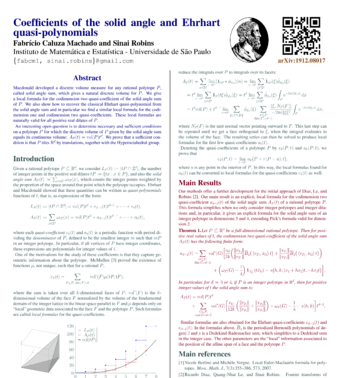 |
| Exact Solutions for Area-Optimal Simple Polygonization Problems (abstract) | Natanael Ramos, Pedro J. de Rezende and Cid C. de Souza | Natanael Ramos | 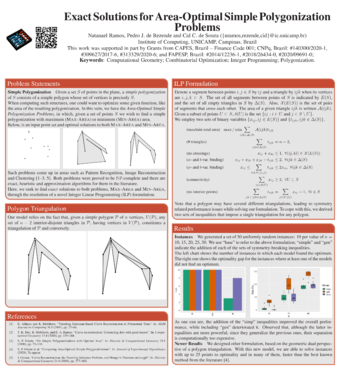 |
| W[1]-Hardness of the k-Center Problem Parameterized by the Skeleton Dimension (abstract) | Johannes Blum | Johannes Blum | 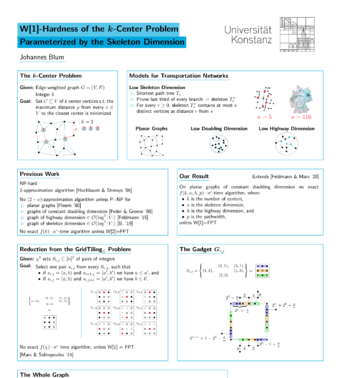 |
| Linial's Conjecture for Matching-Spine Digraphs (abstract) | Jadder B. de S. Cruz, Cândida N. da Silva and Orlando Lee | Jadder B. de S. Cruz | 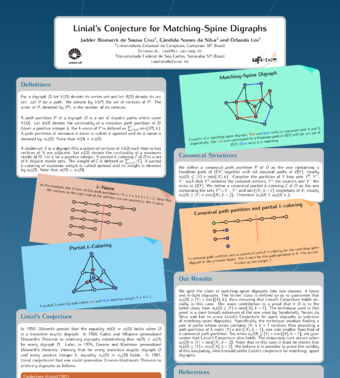 |
| Exact Algorithms and Heuristics for the Perfect Awareness Problem (abstract) | Felipe de C. Pereira, Pedro J. de Rezende and Cid C. de Souza | Felipe de C. Pereira | 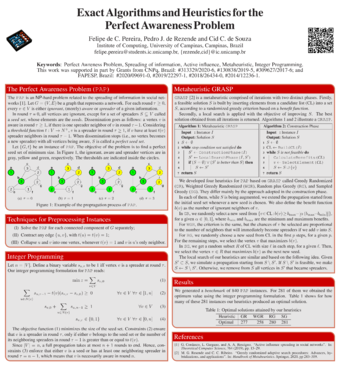 |
Poster session 2 (Wednesday and Friday)
| TITLE | AUTHORS | PRESENTER | DOWNLOAD |
|---|---|---|---|
| Intersection of longest paths in 4-connected graphs (abstract) | Juan Gutiérrez | Juan Gutiérrez | 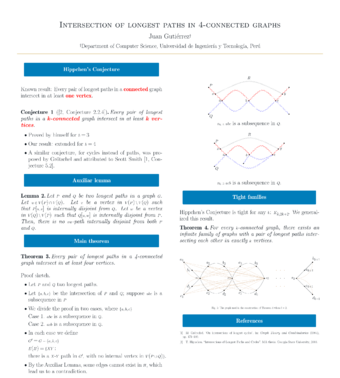 |
| Valid inequalities for the Integer Knapsack Cover polyhedron with setup constraints (abstract) | Natália S. Rodrigues and Socorro Rangel | Natália S. Rodrigues | 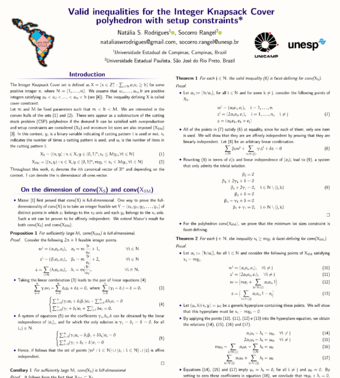 |
| On total chromatic number of circulant graphs (abstract) | Mauro N. Alves Junior and Diana S. Nobrega | Mauro N. Alves Junior | 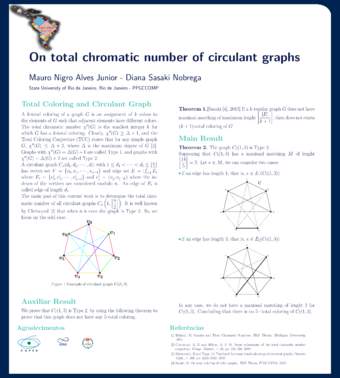 |
| Maximum acyclic subgraph under conflict constraints on bounded degree graphs (abstract) | Leonardo C. Abreu, Manoel Campêlo and Ana K. Maia | Leonardo C. Abreu | 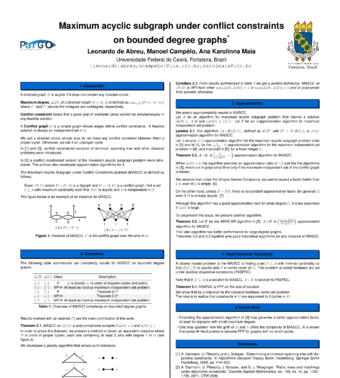 |
| Chromatic number, orientations and subtrees (abstract) | Tássio Naia | Tássio Naia | 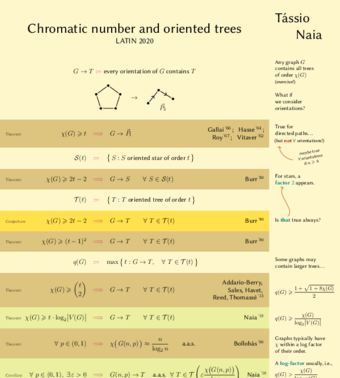 |
| Token Swap in Cographs (abstract) | Caio Tonetti, Vinicius Santos and Sebastián Urrutia | Caio Tonetti | 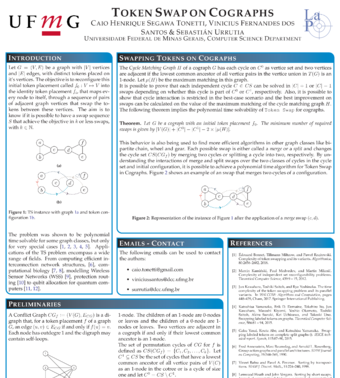 |
